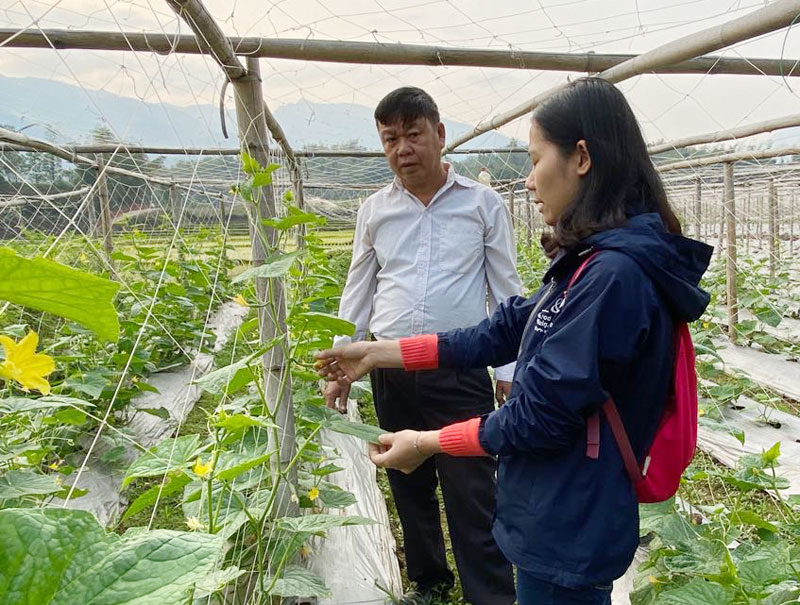
(HBO) – The Good Neighbours International (GNI) in Vietnam has helped brought a facelift to Muong Pa region, stretching across Xam Khoe and Bao La communes in Mai Chau district, Hoa Binh, where locals have been living on agriculture for generations.
Agriculture in Muong Pa is seeing positive transformation
with new thinking and approach, said Ha Thanh Hoan, Secretary of the Bao La
Party Committee. It was owing to the support of the GNI in Vietnam, he added.
 GNI staff in Mai Chau provides training on clean agriculture for
farmers in Bao village, Bao La commune.
GNI staff in Mai Chau provides training on clean agriculture for
farmers in Bao village, Bao La commune.
The international humanitarian development non-governmental
organisation has been supporting the development of livelihood in Muong Pa through
a project on rural development assistance in Mai Chau, phase 2 from 2015 –
2019.
Before the project was carried out, people in Bao village,
Bao La commune only farmed wet rice, but with the help of GNI, farmers here
have started planting higher-value side crops in their paddy terraces.
Under the project, a cooperative for pig farming in Muong Pa
was also established in August 2018, starting with ten farmer households in Bao
La and Xam Khoe.
In the two communes, eight livelihood groups have been founded
in which farmers are provided with advanced agricultural techniques and
knowledge on food safety practices. They were also trained in how to develop
business plans; and together they visited agricultural demonstrations.
The group members have been also offered with soft loans
worth nearly 2.1 billion VND to expand their production.
To scale up safe agriculture production models, the GNI has
built two inner-field ditches with a total length of 700 metres to supply water
for 13 hectares of fields at a cost of over 166 million VND.
Of 119 poor and near-poor households who are members of the
project’s livelihood groups, over 84 percent said they are satisfied with the
livelihood support while only 1.7 percent were not satisfied because they
believed the loan repayment deadlines should stay in line with the production
cycles and the members should receive bigger loans.
Besides these 119 households, 11 others have taken part in a
livelihood group for safe vegetable and fruit farming which have reported an
increase in their income per capita per year from 9.5 million VND in 2016 to 25
million VND last year./.
ss
More than just an information technology teacher, Bui Van Nien is an inspiring figure who has nurtured the scientific curiosity and creative spirit of students in Vietnam’s ethnic minority communities.
Da Bac is the most disadvantaged mountainous district in Hoa Binh province, with ethnic minorities accounting for about 90% of its population. Over the past years, the district has mobilised resources to implement ethnic policies to improve the quality of life of local people.
In recent years, Hoa Binh province has consistently prioritised the protection, care, and education of children, particularly those from ethnic minorities and disadvantaged backgrounds, by creating a safe, healthy, and nurturing environment for their all-round development.
The Steering Committee for Tobacco Harm Prevention and Control of Hoa Binh province, in coordination with the Tobacco Harm Prevention and Control Fund, held a ceremony on May 28 in response to the World No Tobacco Day (May 31) and the National No Tobacco Week (from May 25 to 31). The event was chaired by Nguyen Van Toan, Standing Vice Chairman of the provincial People’s Committee and head of the Steering Committee.
Since 2021, the Center for Industrial Promotion and Industrial Development Consulting (CIIDC) under the Department of Industry and Trade has been implementing a school lighting model as part of the plan for using energy efficiently and economically in Hoa Binh Province in the pẻiod of 2021 - 2025. This model not only aims to improve the learning conditions and enhance the education quality, but it also promotes the message of energy saving, energy security, environmental protection and contributes to the goals of socio-economic development.
In the 2024 - 2025 school year, the entire Hoa Binh provincial education sector includes 520 educational institutions and schools. Among them are 13 ethnic boarding schools with 153 classes and 4,487 students. Four of these schools have met national standards, reaching 30.7 percent.



 GNI staff in Mai Chau provides training on clean agriculture for
farmers in Bao village, Bao La commune.
GNI staff in Mai Chau provides training on clean agriculture for
farmers in Bao village, Bao La commune.